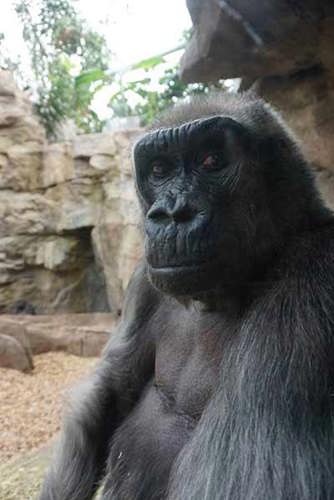Gorilla to undergo a general physical examination, including a cardiac work-up, at Franklin Park Zoo
Thursday March 28, 2019
 Gigi, a western lowland gorilla, will be put under anesthesia tomorrow at Franklin Park Zoo so the zoo’s veterinary staff can examine her.
Gigi, a western lowland gorilla, will be put under anesthesia tomorrow at Franklin Park Zoo so the zoo’s veterinary staff can examine her.
At 46 years old, Gigi is the oldest member of the gorilla troop at Franklin Park Zoo and among the oldest gorillas living within the North American population managed by the Association of Zoos and Aquariums. Gigi has been off-exhibit recently due to ongoing health issues, including a urinary tract infection and changes in energy, mobility and appetite.
While Gigi’s health has been improving, tomorrow’s exam, which will include a general physical check-up, blood work and a cardiac exam, will provide a more complete picture of her overall health.
During her time off exhibit, care staff is working diligently to monitor Gigi’s behavior, administer medications and work on improving her food consumption, while doting on her constantly with some of her favorite enrichment. Gigi’s favorite enrichment items include blankets, which she is often spotted carrying and making “nests” with, and food treats including banana peels, grapes, and yogurt – which her care staff have been using to help administer her medication. In addition to being an enjoyable snack, the yogurt also contains important probiotics, protein, and calories for Gigi.
“The veterinary and animal care teams take extraordinary care of our geriatric animals to ensure that they enjoy a healthy and comfortable life as they age. While we have been able to closely monitor Gigi’s health through our well-established training program, tomorrow’s exam will provide a more comprehensive view of her overall health and may inform our care plans moving forward,” said Dr. Eric Baitchman, Zoo New England Vice President of Animal Health and Conservation.
Through training programs, zookeepers and veterinarians are able to regularly listen to the gorillas’ heartbeats, perform cardiac ultrasounds, listen to lungs with a stethoscope, administer injections, and check their eyes, ears, teeth, feet and hands.
While Gigi’s examination is part of the zoo’s comprehensive wellness program, whenever anesthesia is administered there is always a risk to the animal and people involved in the procedure.
“Gorillas are wild animals and as such, pre-anesthetic evaluations as extensive as those that would routinely be done on people and domestic animals, are not possible,” said Baitchman. “Any animal immobilization involving general anesthesia always carries some risk. We never enter into these procedures lightly and every possible effort is made to keep the animal, as well as the people involved in the procedure, safe and healthy.”
The exam is expected to last at least two hours.
Zoo New England is a proud, longtime supporter of conservation work on behalf of gorillas, including the Ape TAG Conservation Initiative, a collective effort by zoos to help conserve wild populations of endangered apes in their natural habitats. Habitat loss is among the major threats faced by gorillas. Recycling cell phones and other electronics reduces the need for additional coltan, a component of cell phones that is mined in central African forests right in the gorillas’ habitat. This, in turn, reduces the destruction of gorillas’ homes. Guests to Franklin Park Zoo can drop off their old cell phones, which are recycled through the Eco-Cell program.

